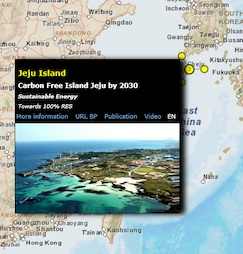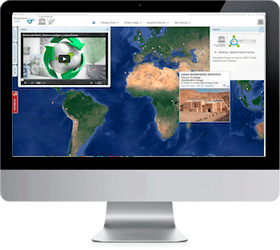100 percent replacement of the current diesel generation to new and renewable energy generation by 2030.
 On July 10 2012, the Jeju Energy Corporation (JEC) officially opened at the Jeju Chamber of Commerce and Industry. This marks one of the first steps towards Jeju achieving its recently announced “Carbon Free Island Jeju by 2030” plan, which aims to make the island completely self-sustainable through the use of renewable resources by 2030. According to a provincial government the main purpose of the JEC is to bring Jeju from its current 7 percent dependence on new and renewable energy sources to 100 percent by 2030.
On July 10 2012, the Jeju Energy Corporation (JEC) officially opened at the Jeju Chamber of Commerce and Industry. This marks one of the first steps towards Jeju achieving its recently announced “Carbon Free Island Jeju by 2030” plan, which aims to make the island completely self-sustainable through the use of renewable resources by 2030. According to a provincial government the main purpose of the JEC is to bring Jeju from its current 7 percent dependence on new and renewable energy sources to 100 percent by 2030.
The “Carbon Free Island Jeju by 2030” will be implemented in three phases: the first phase is to make Gapa Island carbon free this year; the second phase is to raise the share of new and renewable energy in the total energy market to 50 percent by 2020; and the third phase is to make Jeju Island a world-class carbon free and green growth city by 2030.
Gapa Island will use 100 percent new and renewable energy, and electric vehicles for transportation, and a smart home system will be installed in every household on the island. Also, power lines burial underground, forestation, and landscape improvement projects will be completed by September, when the island welcomes participants of the 2012 World Conservation Congress as one of the congress’ observation courses.
In terms of new and renewable energy development, the Jeju Energy Corporation will be launched to regulate the public use of Jeju’s wind power sources. By 2020, 2 GW offshore wind power, 300 megawatt inland wind power, and 30 megawatt solar power will make up 68 percent or 3,585 giga watts of Jeju’s total electricity demand of 5,268 giga watts.
In the mean time, in an attempt to promote Jeju as a leading smart grid city, the smart grid test bed will be expanded from the current one in Gujwa-eup to Yeon-dong and Nohyeong-dong area in Jeju City and Jungmun Resort in Seogwipo City.
In a bid to replace all the vehicles on Jeju Island with electric vehicles, it is also planned to develop Jeju as a model city for electric vehicles through establishing infrastructures including 225,000 chargers, improving laws and regulations to vitalize electric vehicle usage, and providing incentives for the wider use of electric vehicles.
Tourism and Education: Renewable Energy Exhibit Hall
Constructing the world-class new & renewable energy theme park by creating “carbon free island” and linking “Jeju smartgrid”. In 2010, New & Renewable Energy Exhibit Hall was opened to convert tourism into revenue source domestically and globally.
Smart Grid Test-bed in Jeju Island | KSGI
Jeju New & Renewable Energy Exhibit Hall | ENERGY KOREA
Jeju Smarts Grids
Hangyeong Wind Power Plant, Jeju

© KSGI. Smart Grid Test-bed in Jeju Island.















